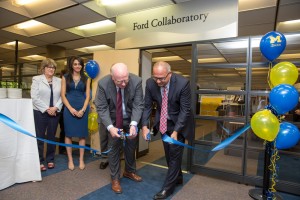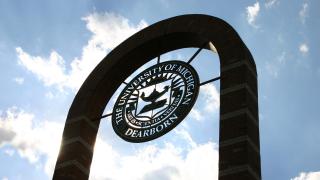
The Ford Collaboratory, located within the Mardigian Library, has been designed as a mix of staff offices with interactive flexible furniture and informal spaces, all which provide state-of-the-art multi-media technology to support future faculty and student engagements with community partners. It provides students better access to their instructors and each other while also bringing the technology and tools needed to accomplish tasks, complex assignments and research academic work right to their fingertips.
“The partnership between University of Michigan-Dearborn and Ford Motor Company began more than 50 years ago when the university was established with a gift of $6.5 million from Ford,” said Daniel Little, chancellor, UM-Dearborn. “We are grateful to Ford Motor Company Fund for their continued support of a number of initiatives at UM-Dearborn. The Ford Collaboratory will deepen the quality of teaching and learning on campus to inspire innovative research, promote engaged learning and collaboration and enhance community impact.”
“This Collaboratory is another indication of our continuing support and enthusiasm for the development and expansion of service-learning curriculum and partnerships between UM-Dearborn and community nonprofits,” said Jim Vella, president, Ford Motor Company Fund and Community Services. “Especially during times like these, the greater Detroit community will benefit from the expertise and engagement of UM-Dearborn faculty and students.”
Since unofficially opening at the beginning of the semester, the Collaboratory has been utilized by numerous students and faculty members as they work together on moving community projects forward. The site also serves as the launch workspace for the Office of Metropolitan Impact, whose goal is to further develop the volume, value and impact of mutually beneficial community partnerships for research, teaching, learning, and service and to enhance the metropolitan vision as a defining dimension of UM-Dearborn.
The Office of Metropolitan Impact provides seed grants to faculty participating in civic engagement and integrated learning projects and programs as a strategy to advance civic-engaged scholarship and community impact. Specifically the goal of the seed grant program is to help nonprofits and community leaders move issues and debates to positive, inclusive, systemic, constructive and lasting community solutions.
Additional programs that will utilize the Collaboratory will be developed in the coming months.


